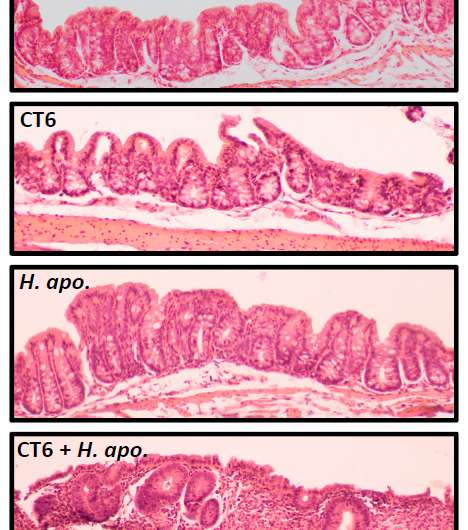In immunodeficient mice, scientists confirmed that Helicobacter prompts T effector cell stimulation during colitis, resulting in a swollen colon (bottom two panels), compared to controls (top two panels). Credit: Chai et al., Sci. Immunol. 2, eaal5068 (2017)
(Medical Xpress)—A group of researchers affiliated with several institutions in the U.S. has found that one type of gut bacteria triggers different kinds of immune responses depending on the state of the environment they are in. In their paper published in the journal Science Immunology, the team describes their study of the gut biome and the Helicobacter bacteria.
Human beings have trillions of gut bacteria types, most of which are beneficial—they provide services such as helping to digest certain foods. But other types of bacteria make their way into the gut and cause problems such as ulcers, colitis and even cancer. In this new effort, the researchers took a closer look at Helicobacter, a bacteria genus that has been implicated as a possible contributor to the development of ulcers and other gut ailments.
As part of their study, the researchers looked at what happened to mice when samples of the bacteria were introduced into their guts under differing conditions. They found that introducing it into healthy mice raised in a nearly germ-free environment resulted in an immune response generally associated with tolerance. Prior research has suggested that such a response is the body's way of signaling the acceptance of a bacteria into the gut because it poses no threat. But when the same type of bacteria was introduced to the gut of a mouse that had colitis, it induced an immune threat response by causing already occurring gut inflammation to become worse. In the second scenario, the immune system clearly saw the bacteria as a harmful invader that needed to be stopped.
The results of these experiments, the researchers claim, suggests that at least one kind of bacteria may be seen as either harmless or harmful depending on the state of the environment it encounters. That suggests the likelihood that the same is true for other bacteria. This finding, they add, could lead to a better understanding of the role that bacteria play in the gut biome and its health, which in turn could lead to better treatment when things go wrong.
Interview with Jiani N. Chai and Dr. Chyi-Song Hsieh. Credit: Juwon Song / AAAS
More information: Jiani N. Chai et al. Helicobacter species are potent drivers of colonic T cell responses in homeostasis and inflammation, Science Immunology (2017). DOI: 10.1126/sciimmunol.aal5068
Abstract
Specific gut commensal bacteria improve host health by eliciting mutualistic regulatory T (Treg) cell responses. However, the bacteria that induce effector T (Teff) cells during inflammation are unclear. We addressed this by analyzing bacterial-reactive T cell receptor (TCR) transgenic cells and TCR repertoires in a murine colitis model. Unexpectedly, we found that mucosal-associated Helicobacter species triggered both Treg cell responses during homeostasis and Teff cell responses during colitis, as suggested by an increased overlap between the Teff/Treg TCR repertoires with colitis. Four of six Treg TCRs tested recognized mucosal-associated Helicobacter species in vitro and in vivo. By contrast, the marked expansion of luminal Bacteroides species seen during colitis did not trigger a commensurate Teff cell response. Unlike other Treg cell–inducing bacteria, Helicobacter species are known pathobionts and cause disease in immunodeficient mice. Thus, our study suggests a model in which mucosal bacteria elicit context-dependent Treg or Teff cell responses to facilitate intestinal tolerance or inflammation.
Journal information: Science Immunology
© 2017 Medical Xpress






















